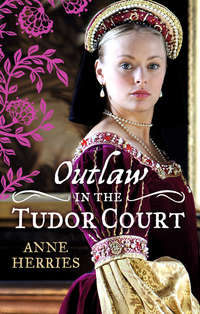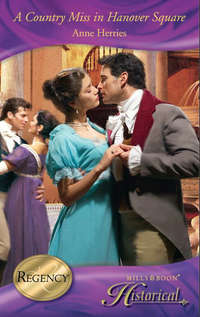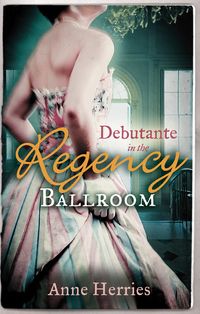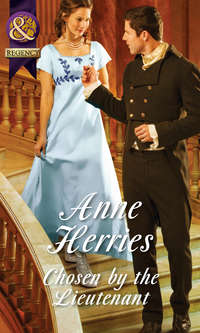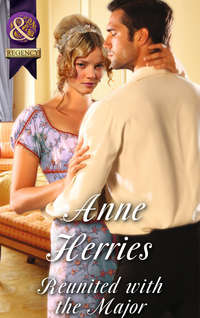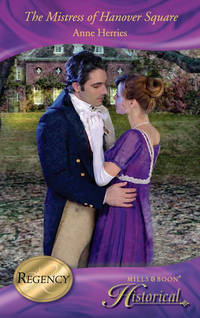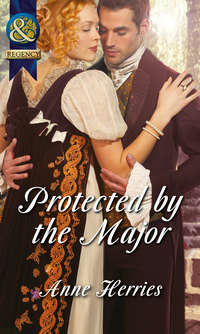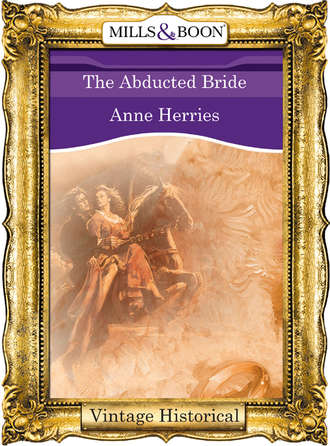
Полная версия
The Abducted Bride

“How dare you take advantage of me, sir?”
Nicholas stepped back. She thought she saw a glimmer of laughter in his eyes, then it was gone, and his expression became harsh, withdrawn.
“I am sworn to one purpose, Mistress Stirling—to avenge the dishonor and murder of a gentle lady. Until then I can promise nothing.”
“I want no promise from you, sir,” Deborah replied. “I am already promised to Miguel Cortes.”
Nicholas stared at her. “You are a stubborn wench, mistress. I pray you will change your mind, lest I make you a widow before ever you are a wife.”
“You are a wicked rogue, sir!”
“I warn you, lady. If you set sail for Spain with this intent, you will never reach its shores. I take anything I can that rightly belongs to the Cortes family—and Miguel’s bride is no exception.”
The Abducted Bride
Anne Herries

www.millsandboon.co.uk
ANNE HERRIES
lives in Cambridge but spends part of the winter in Spain, where she and her husband stay in a pretty resort nestled amid the hills that run from Málaga to Gibraltar. Gazing over a sparkling blue ocean, watching the sunbeams dance like silver confetti on the restless waves, Anne loves to dream up her stories of laughter, tears and romantic lovers. She is the author of over thirty published novels.
Contents
Chapter One
Chapter Two
Chapter Three
Chapter Four
Chapter Five
Chapter Six
Chapter Seven
Chapter Eight
Chapter Nine
Chapter Ten
Chapter Eleven
Chapter Twelve
Chapter Thirteen
Chapter Fourteen
Chapter Fifteen
Chapter Sixteen
Chapter Seventeen
Chapter Eighteen
Chapter One
‘P ray look over there! Now, is he not a fine figure of a man?’ Mistress Sarah Palmer whispered to her cousin and giggled. She clutched at the other girl’s arm in her excitement. ‘Were he to offer for either of us, we should make haste to accept. Would you not agree?’
Deborah Ann, daughter of Sir Edward Stirling, glanced across the crowded gallery of the palace at Whitehall and frowned. The gentleman at whom her cousin had been gazing was indeed handsome, but to her mind he looked proud and arrogant, his dark brown eyes holding a haughty stare as they swept over the assembled courtiers.
‘Oh, Sarah,’ she said, a hint of laughter in her voice. ‘How can you speak so? I vow I should not be comfortable married to such a man. His countenance is so harsh. He looks as if he might be…’ Words failed her. ‘Why, marry, he might be anything. I do not know.’
‘I think he is a sea captain,’ Sarah replied, giving the object of her admiration a roguish smile. ‘He has a brownish look about his skin, as if he were often exposed to wind and weather.’
Deborah glanced again in the direction of the gentleman who had so captured her cousin’s interest. He was looking directly at Deborah and his dark eyes held a distinct gleam of mockery. She turned her head away at once. The wretched man! He need not imagine she was interested in him, for she was not—not one whit!
She cooled her cheeks with the large fan she carried, which was made out of chicken skin and painted with pastoral scenes. Her embroidered satin shoes were new and pinched her toes a little, and the elaborate dress she was wearing had begun to feel heavy and over-warm, for all she had thought it so fine when she chose it. Indeed, her pleasure in being at the Court of King James I was fast waning.
Deborah turned away from the mocking gaze of the stranger, glancing about her with feigned interest. Here, in the older wing of the palace, the gallery walls were thick stone, which kept out both the cold and the heat of the summer day. At night torches flared from iron sconces set at intervals about the large room, but for now the only light was from narrow windows in the thick walls. Here and there a silk tapestry covered the rough surface of the walls, lending colour and warmth to the sparsely furnished chamber, but the floor was flagged with thick stone tiles of black and white, its icy coldness sending a chill through her body.
How she wished they were back in her father’s pleasant manor house, with its wooden floors and the fresh scent of herbs replaced daily to keep the air sweet. Deborah would not have wasted such a lovely day inside, for her herb garden would have tempted her out into the sunshine.
She spied her father in conversation with a tall, thin gentleman; the other man had pale, pinched features and wore clothes of black and silver, his body hunched as if he felt the chill of the palace in his very bones. Seeing Sir Edward nod his head at her, Deborah began to make her way towards them, here and there exchanging a pleasant word with various acquaintances as she passed.
She was fond of her father, and proud of his air of distinction, which marked him out as a man to be reckoned with. He, too, was thin but upright in his stance: a handsome man, though past his prime, his hair streaked with silver at the temples and his eyes a faded blue that held memories of his private sorrow.
Sir Edward had brought his daughter and her cousin to Court this very week, and this was their second attendance at His Majesty’s promenade. Deborah had been a little disappointed at how swiftly the King had passed through the assembled ladies and gentlemen, noticing only a few and passing on without speaking to more than one or two favoured courtiers.
She had heard much talk of the King before she came to Court, and a great deal of it was not good; people spoke disparagingly of his temper, his obsession with witchcraft, his lifestyle and his love of hunting, but Deborah had thought him merely sad and a little ugly.
Sir Edward’s purpose in bringing the two young women to Court was to find husbands for them both if possible, but Sarah Palmer in particular. Sarah had some three years earlier lost both parents to the plague. Fortunately, she had been from home at the time and thus escaped taking the terrible illness. When he had been informed of the terrible tragedy of his sister and brother-in-law’s deaths, Sir Edward had gone immediately to fetch Sarah to his home, where she had since resided as friend and companion to his daughter.
Deborah Ann and Sarah were much of an age, being close to seventeen years and therefore well ready to be married. Sarah’s parents had died before the arrangements could be made for her marriage, and Deborah’s betrothed husband had been taken by a dread fever when but seventeen years himself.
Since the death of a young man of whom both he and Deborah had been fond, Sir Edward had been in no hurry to see his only child wed. Nor did he wish to have her marry out of her faith, for he and his dear lost wife had been devout Catholics. However, during the reign of the present king it had proved wise not to flaunt this fact to the world.
When Queen Bess was on the throne Sir Edward had been a frequent visitor to Court, for Gloriana tolerated those she liked no matter what their faith, and after her death he had retired to his home in the north of England.
James I was a man with whom it was possible to find favour if one was prepared to court it—and most were more than willing for the wealth such favours could bring.
Sir Edward did not court the King’s favour, neither did he speak against him, preferring to mind his own business, living quietly on his estate and tending his land. He would not have come now to London had not the matter of his ward’s marriage begun to weigh on his conscience. It was time both girls were wed, and if he found his house too empty after they had gone, he must look about him for a pleasant widow to warm his bed and tend his comforts. Yet he could not imagine his life without Deborah. He smiled as she approached.
‘Father,’ Deborah said, reaching his side at last. ‘I grow weary. May we not go to our lodgings?’
‘Ah, daughter.’ Sir Edward looked at her with affection mingled with approval. She was without doubt a beauty, though perhaps a little too slender. Her cousin was more comely, but her fair English rose looks were not as striking as Deborah’s dark chestnut curls and green eyes. ‘This is well met, my dear. I wished to introduce you to this gentleman. He asked if he might speak with you himself.’
‘Mistress Stirling—your servant.’ The gentleman spoke English with a heavy foreign accent as he bowed gracefully to her. ‘I am the ambassador of Don Manola Cortes, a gentleman of high rank and the owner of fine vineyards in Spain.’
‘I have done business with Señor Juan Sanchez for many years,’ Sir Edward said to his daughter. ‘Some twenty years ago I had the honour to call Don Manola my friend, and Señor Sanchez has brought me much good wine from his vineyards.’
‘My master is a wealthy man,’ Señor Sanchez went on with a smile for Deborah. ‘He has a son, Mistress Stirling. A fine young man of just five and twenty. It has long been the Don’s hope to see his son wed to a worthy young woman. I believe I may at last have found the lady he seeks—a lady of both birth and beauty.’
‘Not so fast, señor,’ Sir Edward interrupted with a smile of caution. ‘My daughter and myself will listen to your flattering proposal. You shall be given a fair hearing, but I must know more of Don Manola’s son. You will furnish us with a likeness of the gentleman if you please, and if my daughter favours the young man—and he her, of course—we may then discuss the details of a marriage contract.’
‘You indulge Mistress Stirling,’ Señor Sanchez replied. He seemed surprised and not altogether pleased. ‘Our ways are more direct, I think. In Spain a father’s wishes are paramount.’
‘Many an Englishman would agree with you,’ Sir Edward said, his eyes meeting the Spaniard’s steadily. ‘It is, of course, accepted that a daughter should marry where her father pleases, but Deborah Ann is precious to me. I shall not lightly give her to any man—no matter how wealthy or virtuous. Her happiness is also mine.’
‘My father does truly indulge me,’ Deborah said, her mouth soft with love as she looked at him. ‘Yet my respect for his wishes is all the greater because of it, sir. I am confident that he wishes only my good, therefore my pleasure is to obey him in all things.’
‘Not quite all,’ Sir Edward murmured. ‘You manage to have your way in many things, daughter.’
Deborah laughed, tossing her head and gazing mischievously up at him. ‘But that is because you are so very kind to me, sir.’
Father and daughter smiled in perfect understanding. Both knew that the girl was capable of twisting the man around her little finger, but both also knew that their love and respect was mutual: neither would willingly distress or hurt the other.
‘Your willingness to oblige your father is most pleasing, Mistress Stirling,’ said Señor Sanchez. ‘I return to Spain on the evening tide tomorrow and will carry news of your beauty and good character to my master.’ He bowed low before Deborah and her father. ‘If you wish it, I shall carry a letter from you to my master, sir. With fair winds I shall return in three weeks. I shall then be able to bring greetings from my master’s son.’
‘The letter will be ready in the morning. We wish you a safe voyage, señor. Do not neglect to bring Don Miguel’s likeness,’ warned Sir Edward with a smile for his daughter. ‘All the ladies like a well-favoured man. Is that not so, Deborah?’
Señor Sanchez bowed once more and walked away.
‘He has always been honest with me in business,’ Sir Edward said to his daughter when the Spaniard had disappeared amongst the press of courtiers. ‘I have settled nothing, Deborah. If you should meet a suitable admirer you truly like and respect before Sanchez returns, I shall not force you to this marriage—nor yet if you should form a dislike for the idea. I would have you content in this as in all things, Deborah.’
‘You are always so good to me, dearest father,’ Deborah said, her hand on his arm. ‘I shall be guided by you. I know you wish only that I might be as happy with my husband as you and my mother were together.’
Sir Edward’s faded blue eyes clouded with sorrow. ‘Would that my dear Beth were here with us now. How proud she would be of her daughter.’ He sighed and touched Deborah’s cheek. ‘It cannot be. Now—did you say you wished to return to our lodgings?’
‘Yes, Father. May we, please? We have seen His Majesty’s procession. There is no reason to linger—and my shoes pinch.’ She did not add that she thought the King so ill favoured with his large eyes, thin beard and ungainly stature that she had found the sight of him progressing through his fawning courtiers less than inspiring.
Sir Edward laughed. ‘Uncomfortable shoes! A better reason could not be found. Where is your cousin?’
‘I left her in conversation with Mistress Goodleigh, but…oh, there she is. She seems to be talking to a gentleman.’
‘No gentleman, if rumour be truth,’ Sir Edward replied with a frown of disapproval. ‘That is the Marquis de Vere, a Frenchman by birth though his mother was an English gentlewoman—and he himself a privateer by all accounts. He preys on Spanish ships. Sanchez has complained of his actions to the King, but apparently his words fell upon deaf ears. His Majesty promised only that he would consider the matter.’
‘Surely His Majesty must listen to the Don’s complaints,’ Deborah Ann said. ‘We are not at war with Spain. Are not the prince and my lord Buckingham in Spain to treat for a marriage between the Spanish King’s daughter and Prince Charles?’
‘Indeed, it is so,’ Sir Edward agreed. It was the news that the negotiations for the Catholic marriage had seemed to go well that had encouraged him to venture to Court once more. ‘One would think His Majesty would rather hang de Vere than welcome him to Court—but it seems the rogue finds favour in the royal eyes.’
‘Why would that be, Father? The marquis is little better than the Algerian pirates who prey on our ships.’
‘Queen Elizabeth was wont to smile on such men,’ Sir Edward said with a little frown. ‘One could not blame her so much, for the might of Spain could have snatched the crown from her had our brave sailors not beaten off the great Armada the Spanish sent against her—but our present king should have no need to fear Spain.’
‘Then one must suppose His Majesty to have other reasons for his leniency.’
‘With a king it is always best to suppose nothing and be ever on one’s guard,’ Sir Edward replied. ‘Your cousin is alone now. Go to her and tell her we are almost ready to leave. There is someone else I must speak to for a moment and then we shall go.’
‘Yes, Father.’
Deborah began to walk towards the spot where she had last seen her cousin. Where was Sarah? Oh, there she was! She had moved to the other side of the gallery. Changing her direction to catch up with her, Deborah was startled when a man stepped directly into her path.
‘Whither so fast?’ a deep, husky voice asked. Deborah caught the faint accent, which she realized must come from his having spent much of his life in France. ‘Why are you in such a hurry, mistress? You were like to knock me down in your haste.’
That was most unlikely! Deborah stared up into the wicked dark eyes of the Marquis de Vere and drew in her breath sharply. Close to, he was even larger than he had seemed from a distance. A powerful man with broad shoulders and strong thighs, his nearness was intimidating. His court dress was fashioned of black velvet slashed through with dusky gold braid, his doublet heavily sewn with jet bugles.
Unusually in these times he wore no beard, though a slight shadow could be discerned on his chin as if it were some hours since he had shaved. His hair was dark brown and waved thickly back from his brow, and he wore only a small ruff about his neck. Even in court clothes, which taken to excess could appear ridiculous on some, this man had the look of an adventurer.
‘It was you who impeded my progress, sir,’ Deborah replied, her head high, two spots of colour in her cheeks. ‘I pray you, allow me to pass. I wish to speak with my cousin.’
‘Ah, yes, the pretty Mistress Palmer,’ Nicholas Trevern, Marquis de Vere, murmured throatily. ‘A bold wench that one, and no better than she ought to be, I’ll vow.’
‘How dare you impugn the honour of my family?’ Deborah’s eyes flashed with anger. ‘If I were a man I would demand satisfaction, sir!’
‘I could afford you a deeper satisfaction as a wench, Mistress Stirling.’
The expression in his eyes coupled with the mockery in his voice shocked her. She knew that men were freer in their speech in town than she was accustomed to hearing in her father’s house, where she was always accorded the deepest respect, but this was outrageous. How dare he make such a ribald suggestion to her!
‘You are unwise to insult me, sir. My father has powerful friends.’
‘Indeed?’ Laughter danced in Nicholas’s eyes. ‘Would you have me hanged drawn and quartered for daring to tease you, mistress?’
‘I have no wish to listen to your teasing, sir.’
‘Have you not? Your cousin seemed amused.’
‘My cousin is young and perhaps something foolish.’
‘Of your own age, methinks?’ He made her an elegant leg. ‘Forgive me, mistress. I bow to your superior wisdom.’
‘You are pleased to mock me, sir.’
It was all Deborah could do not to stamp her foot. Oh, if she were but the son her father had hoped for and never had! She would teach this devil a lesson he would not soon forget.
‘One must mock at life,’ Nicholas went on before she could make up her mind how to deliver her set-down. ‘Too oft life plays its cruel jests on both the godly and ungodly alike. ’Tis as well to laugh in the face of fate as lie down beneath it. Yet I meant not to offend you, mistress. Go on your way in peace.’
He stood aside. Deborah swept past, the wide skirts of her sumptuous gown swaying with indignation. It was as well for her peace of mind that she did not turn her head to look back, for the sheer delight and mischief in Nicholas’s eyes would have added to her sense of frustration. How many times had she longed to be free of all the restrictions placed on a woman? How often she had wished herself a man, and never more so than now. Oh, that dreadful man should suffer if she but had a sword to run him through!
Deborah was no stranger to swordplay, or to a man’s costume. Her father had indulged her in whims others might find strange. He had been amused to see her strut and playact in her role as a youth, and had delighted in her skill with the rapier.
‘I vow I could wish for no finer son,’ he had told her once when they had practised the art of fencing together and he found himself disarmed. ‘But this must be our secret, Deborah, for the old tabbies would speak you ill if it were known you had behaved so immodestly.’
‘I care naught for the spite of tabbies,’ Deborah had replied confidently. ‘But as you ask it, Father, I shall be discreet. What we enjoy in private shall remain so.’
‘You are always my good daughter,’ her father had teased, a smile curving his mouth. ‘I must be on my guard for ’tis certain you will want something—a new gown, perhaps?’
‘How should I want a new gown when I already have so many?’ Deborah asked, then a little smile flickered in her green eyes—eyes that had caused many a young village lad to dream of her in vain. ‘But there is one thing you might do for me—if you wish?’
‘Of course, daughter. What is it now? Would you have me give more of my gold to master parson—or open my kitchens to every beggar in the whole of Northumbria?’
‘It is just Mistress Donovan. She is a widow now, Father, with three small children. All I ask is that she may remain in her cottage until she can find a man to take her husband’s place.’
‘Of course, child. She is a comely good woman. I dare say a man can be found to wed her before I am entirely ruined by lack of rent or labour.’
‘Oh, Father!’
Deborah had laughed at his gentle mockery of her good works. Yet she was not moved to laughter by the wicked teasing of the Marquis de Vere, though in her heart she could not find him guilty of malice. When he smiled he did not look so very harsh, but there was mettle in him. She thought that he might make a fearsome enemy, and a little chill ran down her spine. For a moment it was as if a dark cloud had passed over her and she was afraid of something, but of what she could not be sure. It was just a sense that her life of sweet content was about to change forever.
She shook her head as if to clear it of such thoughts. Sarah had turned her way and she lifted her hand to beckon her to her side.
‘It is time we were leaving,’ she said as her cousin came up to her. ‘I have had enough of the Court for one day.’
‘Oh, must we go?’ Sarah dimpled as a young man smiled at her from across the crowded gallery. ‘I have found our visit vastly amusing, have you not, cousin?’
‘It is interesting to see so many gathered here in the hope of a smile or some notice from His Majesty,’ Deborah replied. ‘Though his appearance was so brief that most must have been disappointed.’
‘Oh, the King…’ Sarah pulled a laughing face. She was well aware that she had aroused the interest of more than one gentleman that day. ‘It is not His Majesty’s attentions that I care for, cousin.’
Deborah noticed the young man who was staring so hard in their direction and smiled inwardly as she saw the flush in Sarah’s cheeks.
‘Come, Sarah,’ she urged. ‘Master Henderson will find his way to our lodgings if he wishes to further his acquaintance with our family.’ So saying, she took her cousin’s arm and began firmly to steer her towards Sir Edward, who was now waiting for them.
The bold-eyed marquis seemed to have disappeared and Deborah was relieved that there would be no more encounters with such a wicked rogue. She wondered that he even dared to appear at Court, for if there were any justice His Majesty would surely hang the fellow.
‘What would ye have of me now, rogue?’ James I of England and VI of Scotland eyed the younger man with amusement. Disfigured by childhood weaknesses and birth defects, he liked to see charming, handsome faces about him and his partiality led to many complaints about his favourites.
‘Why, nothing, sir,’ replied Nicholas. The son of an English gentlewoman and a French nobleman, only a genuine liking for this man some called fool kept him at court. He had estates in France that needed his attention, but James had asked for him and he had come in answer to the summons. ‘I believe you had some need of me?’
‘Mayhap.’ The King frowned. He had to look up to this giant, who towered above most men at Court, and he disliked the crick in his neck it gave him. ‘Sit on that stool by me, laddie. I give ye the royal permission. Aye, I might have need of your services. This foolish venture of my son has cost me dearly, and I do not know what will become of it all in the end.’
‘You mean Prince Charles’s marriage to the Infanta of Spain? I thought it was Your Majesty’s own wish?’
‘Aye, I have thought it for the best. You know I do not want war. These miserly Englishmen will vote me no money for peace, let alone war. The marriage might have brought a lasting peace between our two countries, one that would go on when I am dead—yet I confess I am uneasy. Buckingham and my son went incognito to Spain, thereby placing themselves too securely in the hands of the Spaniards. ’Twas foolishness and against my orders—though you will keep that to yourself, Nicholas. I will not have Baby criticised by others. You hear me?’


